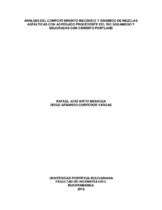Análisis del comportamiento mecánico y dinámico de mezclas asfálticas con agregado procedente del rio Sogamoso y mejoradas con cemento Portland
Fecha
2018Director/Asesor
Galvis Flórez, Julián Andre
Tipo de contenido
Trabajo de grado
Citación
Metadatos
Mostrar el registro completo del ítemDocumentos PDF
Resumen
El objetivo de este proyecto es analizar el comportamiento mecánico y dinámico de mezclas asfáltica con agregado procedente del rio Sogamoso (Santander) y mejorada con cemento portland, iniciando con la caracterización de los materiales a utilizar (Agregados, Cemento Asfáltico y Cemento Portland). Para cumplir con el objetivo, se realizaron los ensayos Marshall y el ensayo de modulo dinámico de mezclas asfálticas. Para desarrollar los ensayos, se elaboraron briquetas convencionales con cinco (5) diferentes porcentajes de cemento asfaltico (4%,4.5%,5%,5.5% y 6%) a las cuales se le realizaron los ensayos correspondientes para determinar el porcentaje óptimo. Luego de obtener el porcentaje óptimo de cemento asfaltico, se procedió a elaborar las briquetas mejoradas modificando el filler con cemento Portland en proporciones diferentes (0%, 25%, 50%, 75% y 100%), a las cuales se les realizó el método Marshall para conocer su comportamiento mecánico, donde se obtuvo resultados de estabilidad y flujo, densidad Bulk y densidad de vacíos. Para conocer el comportamiento dinámico se elaboraron nuevas briquetas con las dimensiones aptas para evaluar su módulo dinámico en la maquina DTS-30 (30 KN DYNAMIC TESTING SYSTEM) bajo los parámetros de la norma AASHTO TP 62-03 del 2005 ensayándolas a tres (3) temperaturas (21.1°, 37.8° y 54.4°) y seis (6) frecuencias (25 Hz, 10 Hz, 5 Hz, 1 Hz, 0.5 Hz y 0.1 Hz) obteniendo como resultados que entre menor es la temperatura en un pavimento el módulo dinámico será mayor. The objective of this project is to analyze the mechanical and dynamic behavior of asphalt mixtures with aggregate from the Sogamoso River (Santander) improved with Portland cement, starting with the description of the materials to be used (Aggregates, Asphalt Cement and Portland Cement). To accomplish the objective, the Marshall tests and the dynamic module test of asphalt mixtures were carried out. To develop the trials, conventional briquettes were elaborated with five (5) different percentages of asphalt cement (4%, 4.5%, 5%, 5.5% and 6%) to which the corresponding tests were carried out to determine the optimum percentage. After obtaining the optimum percentage of asphalt cement, we proceeded to elaborate the upgraded briquettes by modifying the filler with Portland cement in different proportions (0%, 25%, 50%, 75% and 100%), to which the Marshall method was applied to know its mechanical behavior, and the results of stability and flow, density Bulk and density of voids were obtained. In order to know the dynamic behavior, new briquettes with the suitable dimensions were developed to evaluate its dynamic module in the DTS-30 machine (30 KN DYNAMIC TESTING SYSTEM) under the parameters of the AASHTO TP 62-03 of 2005, testing them to three (3) temperatures (21.1 °, 37.8 ° and 54.4 °) and six (6) frequencies (25 Hz, 10 Hz, 5 Hz, 1 Hz, 0.5 Hz and 0.1 Hz) obtaining as a result that the lower the temperature in a pavement the higher the dynamic module will be.
Palabra/s clave
Asfalto
Materiales - Propiedades mecánicas
Cemento
Pavimentos
Sogamoso (Boyacá, colombia)
Colecciones
- Trabajos de grado [6688]
El ítem tiene asociados los siguientes ficheros de licencia:


